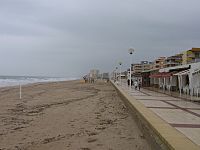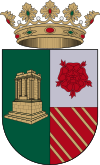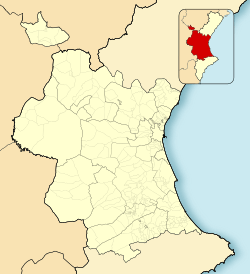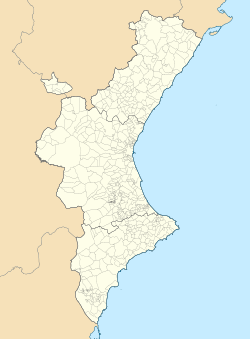Daimús facts for kids
Quick facts for kids
Daimús
|
||
|---|---|---|

Beach in Daimús
|
||
|
||
| Nickname(s):
Daimús
|
||
| Country | ||
| Autonomous community | ||
| Province | Valencia | |
| Comarca | Safor | |
| Judicial district | Gandia | |
| Area | ||
| • Total | 3.10 km2 (1.20 sq mi) | |
| Elevation | 6 m (20 ft) | |
| Population
(2018)
|
||
| • Total | 3,128 | |
| • Density | 1,009.0/km2 (2,613/sq mi) | |
| Demonym(s) | Muser, musera | |
| Time zone | UTC+1 (CET) | |
| • Summer (DST) | UTC+2 (CEST) | |
| Postal code |
46710
|
|
| Official language(s) | Valencian | |
Daimús is a small town, also called a municipality, located in the Valencian Community of Spain. It's part of the Safor area, which is known as a comarca. This charming place is very close to the beautiful Mediterranean Sea.
In winter, about 2,200 people live in Daimús. But when summer comes, the population grows a lot, reaching around 20,000 people! This happens because many tourists come to enjoy the sunny beaches.
| Top - 0-9 A B C D E F G H I J K L M N O P Q R S T U V W X Y Z |
What Makes Up Daimús?
The municipality of Daimús is split into three main parts, each with its own special feel:
El Poble: The Old Village Heart
El Poble means "the village" in Valencian. This is the oldest part of Daimús. Here, you'll mostly find houses with three floors and a church. It's where the town's history first began.
Els Pedregals: The Stony Bungalows
Els Pedregals translates to "the stony place." This area has a group of bungalows, which are small, single-story houses. It's about 1 kilometer (or half a mile) away from the main village and also has a small church.
La Platja: The Lively Beach Area
La Platja means "the beach." This part of Daimús is about 1.5 kilometers (or almost a mile) from the village. It's filled with buildings that are mostly used during summer holidays. Many tourists, especially from Madrid, come here to relax and have fun by the sea.
A Look at Daimús's History
Daimús is a small town located near Gandia, which is the biggest and most important city in this region.
Early Days and Gandia's Influence
Daimús was likely founded in the 13th century. This was after the Reconquista, a long period when Christian kingdoms took back control of Spain from Muslim rule. Because Gandia was so important, especially during the Renaissance (a time of great art and learning), smaller towns like Daimús often stayed in its shadow. This is why not much is known about Daimús's early history, even by the people who live there today.
The Beach Becomes Popular
The beach area of Daimús was mostly empty until the 1960s. At that time, many tourists from France started buying apartments by the sea. They found it very affordable because of the money exchange rates. Some of the first apartment buildings built then were La Torre, Galia, and Costa Blanca.
In the late 1960s, Spain's economy grew stronger. More Spanish families could afford to buy a second home for their summer vacations. This led to many more apartment buildings being built, such as Semiramis, Trianon, Costa Blanca II, Nayade, Finamar I, Finamar II, and Pinocho.
Daimús Grows and Changes
Daimús beach was once known as a "family beach" because it was small and didn't have many hotels. It even had a summer cinema called Terraza Daison. In the 1970s, it was home to one of the very first Pacha discothèques, though it has since closed. By the late 1990s, Daimús began to grow rapidly, doubling its size in about six years!
How Daimús Makes a Living
For many centuries, Daimús was a farming area. People grew vegetables and oranges in its fields.
From Farms to Tourism
Later on, because it was so close to the sea, Daimús became a popular tourist spot. The old farmlands were slowly replaced by new buildings and apartments. Today, most people who live in Daimús work in the nearby cities of Oliva and Gandia.
See also

- In Spanish: Daimuz para niños





